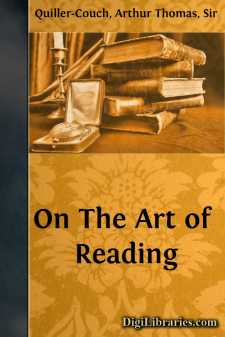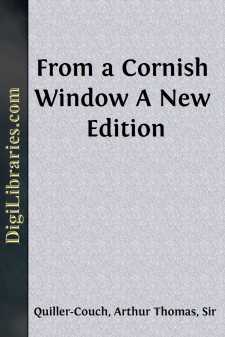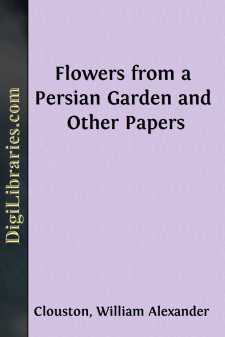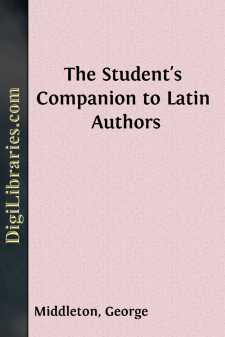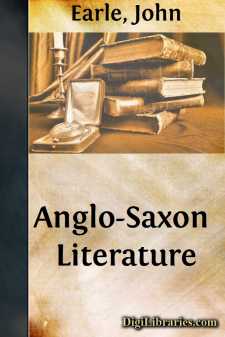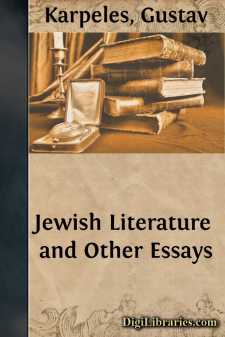Literary Criticism
- American 18
- Ancient and Classical 3
- Asian 1
- Australian & Oceanian 1
- Books & Reading 8
- Caribbean & Latin American 2
- Drama 2
- English, Irish, Scottish, Welsh 49
- European 7
- General 37
- Horror 1
- Humor 2
- Jewish 2
- Medieval 2
- Middle Eastern 3
- Poetry 7
- Renaissance 6
- Russian & Former Soviet Union 1
- Shakespeare 27
Literary Criticism Books
Sort by:
INTRODUCTION. 1. Tongue, Speech, Language.—We speak of the “English tongue” or of the “French language”; and we say of two nations that they “do not understand each other’s speech.” The existence of these three words—speech, tongue, language—proves to us that a language is something spoken,—that it is a number of sounds; and that the writing or printing of it upon paper is a quite...
more...
JOSEPH CONRAD "Under all his stories there ebbs and flows a kind of tempered melancholy, a sense of seeking and not finding...." I take the words from a little book on Joseph Conrad by Wilson Follett, privately printed, and now, I believe, out of print. They define both the mood of the stories as works of art and their burden and direction as criticisms of life. Like Dreiser, Conrad is forever...
more...
LECTURE I INTRODUCTORY WEDNESDAY, OCTOBER 25, 1916 I In the third book of the "Ethics", and in the second chapter, Aristotle, dealing with certain actions which, though bad in themselves, admit of pity and forgiveness because they were committed involuntarily, through ignorance, instances 'the man who did not know a subject was forbidden, like Aeschylus with the Mysteries,' and...
more...
DEDICATION. MY DEAR WILLIAM ARCHER, Severe and ruthlessly honest man that you are, you will find that the levities and the gravities of this book do not accord, and will say so. I plead only that they were written at intervals, and in part for recreation, during years in which their author has striven to maintain a cheerful mind while a popular philosophy which he believed to be cheap took possession...
more...
I SKETCH OF THE LIFE OF THE PERSIAN POET SAADI—CHARACTER OF HIS WRITINGS—THE “GULISTÁN”—PREFACES TO BOOKS—PREFACE TO THE “GULISTÁN”—EASTERN POETS IN PRAISE OF SPRINGTIDE. It is remarkable how very little the average general reader knows regarding the great Persian poet SaádÐÑ and his writings. His name is perhaps more or less familiar to casual readers from its being...
more...
by:
George Middleton
PREFACE The object of this book is to give in a convenient form all the facts of importance relating to the lives and works of the principal Latin Authors, with full quotation of original authorities on all the chief points. It appears to us that these facts are not at present readily accessible; for the ordinary histories of literature are compelled to sacrifice much exact information to the demand...
more...
BRITANNIA. I. The people that now occupies England was formed, like the French people, by the fusion of several superimposed races. In both countries the same races met and mingled at about the same period, but in different proportions and under dissimilar social conditions. Hence the striking resemblances and sharply defined contrasts that exist in the genius of the two nations. Hence also the...
more...
by:
John Earle
CHAPTER I. A PRELIMINARY VIEW. Anglo-Saxon literature is the oldest of the vernacular literatures of modern Europe; and it is a consequence of this that its relations with Latin literature have been the closest. All the vernacular literatures have been influenced by the Latin, but of Anglo-Saxon literature alone can it be said that it has been subjected to no other influence. This literature was nursed...
more...
Introduction My aim in this little book has been to give short sketches and estimates of the greatest modern English writers from Macaulay to Stevenson and Kipling. Omissions there are, but my effort has been to give the most characteristic writers a place and to try to stimulate the reader's interest in the man behind the book as well as in the best works of each author. Too much space is devoted...
more...
by:
Gustav Karpeles
A GLANCE AT JEWISH LITERATURE In a well-known passage of the Romanzero, rebuking Jewish women for their ignorance of the magnificent golden age of their nation's poetry, Heine used unmeasured terms of condemnation. He was too severe, for the sources from which he drew his own information were of a purely scientific character, necessarily unintelligible to the ordinary reader. The first truly...
more...




